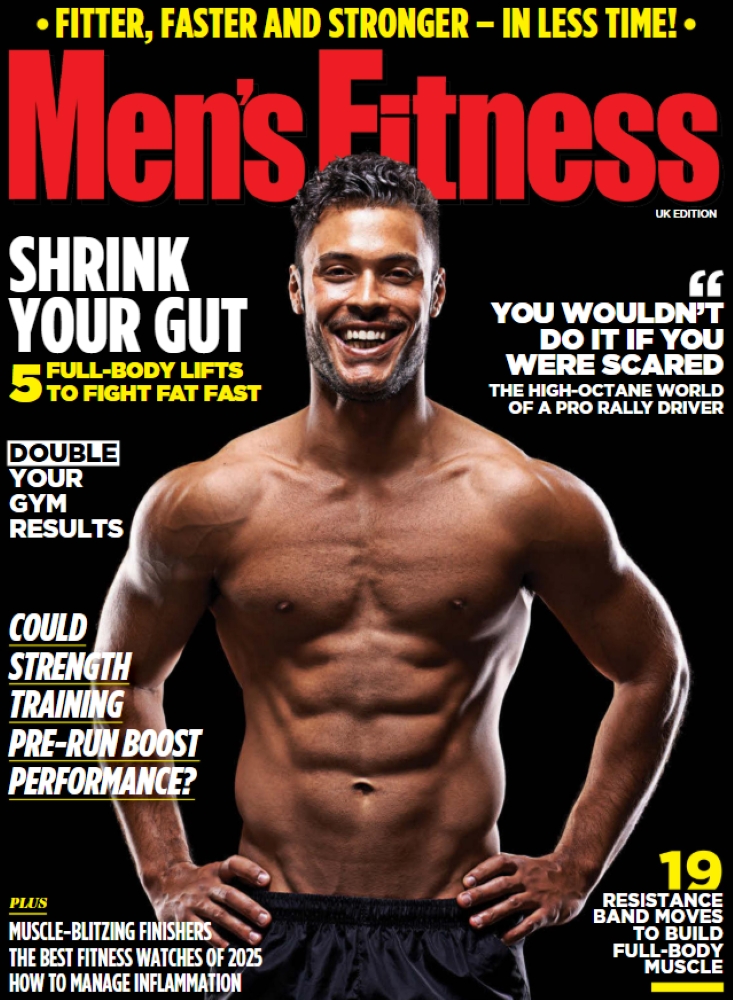Driven by a lifelong passion for running and weight training, motoring presenter Richard Hammond says it’s good for blokes to maintain their bodywork. He talks to MF about masculinity, mindful runs, and why eating fish and chips with mates is good for you…
“Blokes are allowed to consider self-maintenance now!” declares Richard Hammond, with a mix of triumph and relief. “And it’s great! We should. It makes us nicer, better people. We’re not really blundering idiots who don’t care about ourselves or others.”
Through Hammond’s work on boisterous motoring shows like Top Gear and The Grand Tour, we’re used to seeing him enjoying laddish adventures and juvenile banter, not offering heartfelt meditations on men’s health. But following those high-profile crashes – Hammond spent two weeks in a coma after crashing a jet-powered Vampire dragster at 288mph on a Yorkshire airfield in 2006, then shattered his left knee when he sent a Rimac Concept One supercar tumbling into a Swiss ravine in 2017 – health has become a serious subject for the 52-year-old.
The truth is that Hammond has enjoyed morning runs and weight-lifting sessions for decades. But the effects of those crashes – which ranged from painful physical rehab to dark bouts of depression – have crystallised his views on men’s health.
“I’m lucky,” he says, “because I was brain-injured in that crash, so I spent a lot of time contemplating my mental health. So I’m very alert to the influence of neurochemicals – endorphins and everything else – and the difference in me when I’ve been for a run or been to the gym or eaten carefully or exercised mindfully, which is really critical.”
Related content:
- Interview with adventurer and presenter Steve Backshall
- Adam Peaty interview
- Aldo Kane talks functional fitness and his life of adventure
Let’s get a few details straight. Hammond has no interest in strict ‘exercise regimes’ or ‘dietary rules.’ He’s not trying to build a Marvel superhero physique – his wife Mindy and daughters Izzy, 21, and Willow, 19, would roll their eyes at him if he tried. And he loves eating fish and chips. He just wants to feel fit and strong so he can enjoy life at full throttle. Whether he’s lifting weights or hiking in the hills, he is motivated by feeling good. And that is a goal which many guys will buy into.
“Healthy things are not always the things we expect,” insists Hammond. “Not everybody is in a position to say: right I’m going to get up at five o’clock and cycle 50 miles, because they have got to go to bloody work, or they live in city, or they haven’t got access to a gym. But there will be things that we all do that keep us sane and well.”
Hammond is promoting the second series of his Discovery+ show Richard Hammond’s Workshop, which charts the chaos of running the classic car restoration business he set up near his home in Herefordshire with automotive ‘wonder family’ Neil, Anthony, and Andrew Greenhouse.
Hammond’s love of cars is, in itself, proof that men are pretty good at looking after things – whether it’s sports cars, motorbikes, guitars, or their own body – if we really want to. During the laddish noughties Hammond kept his fitness hobbies private, as though it was somehow deemed unacceptable for a man to take an interest in his own health. But men have moved on – and Hammond welcomes the transformation.
“I do think it is changing,” insists Hammond. “But it (men’s health) can sometimes seem exclusive, as though it’s only worth looking after yourself if you’re already in perfect condition and looking and feeling great. Well, who is? This is about basic maintenance!”
Look after your bodywork. Keep your engine running. Use whatever motoring metaphor you like, the message remains the same: men of all ages need to respect their health. That’s why Hammond maintains a well-stocked home gym.
“Bench, free weights… I use adjustable free weights so you can ratchet them up,” he says. “I have three different routines that I do. For example, that might be shoulders and back. But I don’t want to bulk up. So I will stretch and then I will work through 5-6 exercises. And I’ll go through that three times. I don’t do long – half an hour or 40 minutes. But afterwards I feel fabulous. And it means the day is already a winner.”
He has adopted a ‘fractional’ approach to lifting, which helps to maximise his workouts. “There is really nuts,” he laughs. “I like to work to exhaustion. So I just count to ten slowly. I really enjoy the slow pace and the stretch. And this is where I might sound nuts or I might be a genius, but I count the reps as fractions – 1 twelfth, 1 sixth, 1 quarter, 1 third – so I am activating my mind at the same time as my body. And I feel it turbocharging everything.
“And then on the final set, I go for 14 reps. But I count that final set in twos – ‘1, 2’, then ‘3, 4’. Because when I get to 10 I’m approaching exhaustion. And it hurts like bloody hell! But by doing it in twos, if I’ve done 11, I know I’m going to do 12 because they’re paired. And then it’s just one more pair: 13-14. So it is completely OCD but it totally works. And I love it!”
The invisible thread which connects all of Hammond’s health activities is mindfulness, by which he simply means doing things in a conscious way. When he lifts weights, he likes to actively turn on relevant muscle groups and work through the full range.
“A while ago I started to get aches in my shoulders and complex joints,” he recalls. “So I would do simple exercises but very consciously using my leg muscles, back muscles, and major muscle groups. I’d be waking them up, talking them through each lift, and getting them involved. If my shoulder was hurting I would consciously hold it in the right position – not the position my stresses and strains wanted it to be in. I was trying to be my own osteopath. And the aches and pains completely went within a week. Gone!”
Running your engine
Running, however, remains Hammond’s real passion. Managing the workshop has been draining, but running helps him to handle the everyday stresses.
“There are real highs like when we take on my oldest friend Les’s Riley Special and get him to drive up a hill climb and I got all choked up… but it’s also expensive and terrifying, things break, and things go wrong. In terms of stress, I run. That’s how I keep myself sane.”
Hammond adopts a mindful approach to running, purposefully using the time alone to sift through his thoughts. “We’ve all got our own health, wealth, job, career, local people, friends, family, and loved ones to worry about,” he explains. “So when running I strip all of that away and put all of that behind a closed door. I live in my little wheelhouse. It’s a little quiet white room. And when I’m in there, I’m running along thinking: what is under my feet? What’s this terrain like? What’s the wind like across my arms and legs? How does it feel?”
As he relaxes, he then consciously addresses each area of his life in turn. “In my mind, I walk out of that room, into the room next door, which is like a big vault with tables and icons, each of which represents one aspect of my life. In my case, work is represented by a water mill, with lots of moving parts. So I’ll bring that out into my little wheelhouse and put it on the table, and I will think about work, like DriveTribe, my production company, or the workshop. And I will think about it until I’ve thought it all through. Then I’ll put it back and bring another one out. So I consciously do all of that while running.”
The older he gets, the more he enjoys these therapeutic runs. “I’m not trying to beat times. I don’t run competitively – I never have. I compete against myself a bit. But I smashed my left knee to bits in a crash so I am wearing it out, but I am wearing it out consciously. I could probably get 20 years out of it if I did no running. But what state would I be in mentally? Or I could keep running and get 10 years out of it, but I will be stronger and fitter and healthier in my mind as a result. I will be able to get over the (eventual) operation more quickly – and function more quickly again afterwards.”
He enjoys “the clarity and the purity” of running. And he relishes long hikes in the hills for the same reason. “I absolutely love it. What can be more natural? We are built to move around the world at walking or running pace.” He likes cycling too, but is increasingly suspicious of guys overtaking him on e-bikes. “I use a gravel bike and cycle over the hill opposite but there are a lot of mountain bikers with suspiciously large motors on their bikes. They are dirt bikes really, aren’t they?”
Hammond is keen to hammer home the message that millions of men are already doing things that are brilliant for their health – that regular Thursday night catch-up with mates, or that 30-minute lunchtime walk – but we falsely assume that healthy activities must involve sweat and pain.
“I would like to do a TV show on this,” he says, “saying to people that you must be doing something right or you would be dead already! We soon realise: I am already doing some things right, so let me find what they are and do them thoughtfully.”
He uses as an example his fish and chip lunch every Friday with his friends at the workshop. “We sit in the workshop and eat fish and chips and just shoot the breeze,” he explains. “And all sorts would come out: about our lives, cars, hopes, aspirations, career, kids, love lives or whatever. And that’s incredibly therapeutic and incredibly good.”
Hammond is glad that men’s mental health is no longer a “dread concept”. No man should feel overwhelmed. But his own struggles have proven to him that mental health needs to be proactively managed:
“I’ve heard somebody say: my mental health is my right. No, it bloody isn’t! It’s your responsibility. And you need to take conscious steps towards maintaining that. It might mean eating cleanly, but also not beating yourself up if you go for a filthy burger. Allow yourself that, but don’t be surprised if the next day you feel the effects. Mental health requires constant maintenance. It’s your responsibility to deal with it.”
Over the years Hammond has learned to identify which things trigger or turbo-charge his mood. He knows that drinking wine can have a “gloomifying effect”. But he also knows that going for a short run will leave him buzzing for the rest of the day.
“Mental health is like physical health,” he concludes. “You can have low bits and high bits but you can work on it. It’s fixable. It’s mendable. And it’s maintainable.”
Series 2 of Richard Hammond’s Workshop is available to stream exclusively on discovery+








